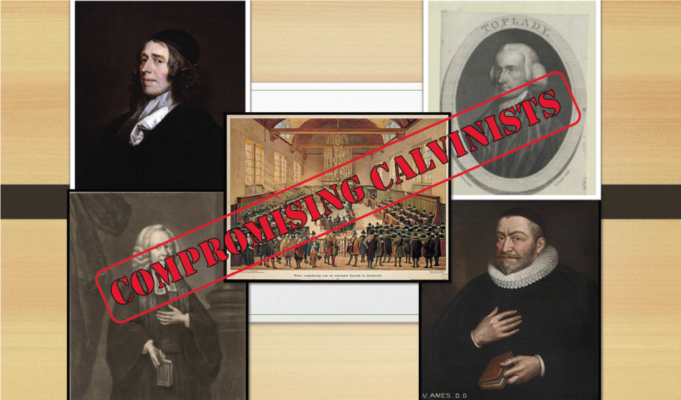If you have not read Compromising Calvinist – When We Just Aren’t Calvinistic Enough (Part 1), please do so first.
As a refresher, in Part 1, we looked at the 6 points of compromise that some of our brethren in question contend are Arminian compromises. Here they are again.
- Common grace
- Progressive Sanctification
- The genuine, free offer of the gospel to all men
- Christ’s atonement was sufficient for all, efficacious for some
- Evidence of regeneration by self-examination (i.e. fruit)
- Believing that some Arminians are saved despite their inconsistency
Canons of Dordt – Arminian Compromise?
Let’s start with the Canons of Dordt. Some of our “high” Calvinist friends at one point used to call themselves Dortian Calvinists but soon dropped the label. For good reason too. Not even the Calvinists at Dordt were Calvinistic enough.
If you are aren’t familiar with this controversy during the Dutch Reformation and the Synod of Dordt, I highly recommend researching it (it is the 400-year anniversary after all). Although it gets misrepresented for being a one-sided Arminian witch hunt, it was nothing of the sort. There were some serious theological errors and heresies that were indeed being addressed there. Arguably, there were some things that the Remonstrance posed at that Synod that would even make some Arminians (loosely speaking) cringe today. But more than just opposing Arminianism, the Canons teach us theological balance, systematic theology, a consistent view of monergistic grace and the gospel, as well as the original intent of the now T.U.L.I.P. acronym. Of which, if we understood scripturally, would diffuse much of the confusion we see today even among popular men like Leighton Flowers, let alone this sect of Calvinists.
The more interesting fact to point out, however, is that the Canons of Dordt not only proclaimed points 1-5 above, but, at various times stressed 2 & 5 (Progressive Sanctification & Fruit Examination). Which some of our friends in question would call Arminian compromise. Because this topic is so vast, I will just point out two points I quoted from the Canons that reveal that the “compromise” lies not just with me (if we are going to be consistent).
Regarding the Assurance of Our Election, the Canons say:
“Assurance of their eternal and unchangeable election to salvation is given to the chosen in due time, though by various stages and in differing measure. Such assurance comes not by inquisitive searching into the hidden and deep things of God, but by noticing within themselves, with spiritual joy and holy delight, the unmistakable fruits of election pointed out in God’s Word—such as a true faith in Christ, a childlike fear of God, a godly sorrow for their sins, a hunger and thirst for righteousness, and so on” (First Main Head, Article 12). (underline mine)
This point is relevant because some of our Calvinistic brethren will say that we should not look to “fruits,” “evidence,” or “progress” in sanctification. Because when we do, we are adhering to Arminian doctrine. Historically, evidence of salvation has long been taught, because Scripture affirms it. But another point within the Canons (like many other points) sheds more light on this when expounding upon the Preservation/Perseverance of the Saints. Regarding our sinful weakness, it says say:
“Hence daily sins of weakness arise, and blemishes cling to even the best works of saints, giving them continual cause to humble themselves before God, to flee for refuge to Christ crucified, to put the flesh to death more and more by the Spirit of supplication and by holy exercises of godliness, and to strain toward the goal of perfection, until they are freed from this body of death and reign with the Lamb of God in heaven” (Fifth Main Point, Article 2) (underline mine)
And regarding this assurance, the Canons not only state that the measure of one’s faith can vary from person to person (Fifth Main Point, Article 9), but the very next article (Article 10) says:
“Accordingly, this assurance does not derive from some private revelation beyond or outside the Word, but from faith in the promises of God which are very plentifully revealed in the Word for our comfort, from the testimony of “the Holy Spirit testifying with our spirit that we are God’s children and heirs” (Rom. 8:16-17), and finally from a serious and holy pursuit of a clear conscience and of good works. If God’s chosen ones in this world did not have this well-founded comfort that the victory will be theirs and this reliable guarantee of eternal glory, they would be of all people most miserable.” (underline mine)
Far from being Arminian doctrine, looking to ourselves to find fruit and evidence of salvation, and to pursue holiness and perfection, meanwhile trusting in the promises of God, by faith, for our preservation/perseverance is just Soteriology 101 (not the Leighton Flowers kind). But why do some believe this isn’t the case? Because of an imbalanced, unsystematic, and inconsistent stance about what the Scriptures teach!
More could be expounded upon. And even more could prove how even those who wrote the Canons would technically be “compromisers” according to this gild. But let’s ask ourselves a few questions:
Did this international, highly Calvinistic Synod, which came together to address the Arminian controversy at hand, compromise the gospel? Could their affirmation of points 1-5 (even though we only looked at 2 & 5) be rightly called “Arminian?” Was this Synod full of Arminian compromisers? Is it historically fair to assert that even statements like “Christ’s atonement is sufficient for all, efficacious for some,” is Arminian teaching when it comes from the Canons (Second Main Head, Article 3)? Or that self-examination concerning the fruit of regeneration or progressive sanctification is only “Lordship” heresy? Of course, these are mainly rhetorical. Because anyone who does even a surface reading of the Canons would know that these were not Arminian compromisers. But biblical teachers/pastors who sought to balance the Scriptures rightly.
(Note: I do not approve of the CRCNA that modernized the language of the Canons of Dordt in the attached links. I only appreciate the effort to make it readable. The Puritan Reformed Seminary link is a more excellent ministry and resource to discover more about the Canons.)
William Ames – Cowardly Calvinist?
How about a man like William Ames who was part of the English delegates there at the Synod? He was not only an ardent defender of Calvinism against Arminianism, but some say that he was an advisor to the President of the Synod, Johanne Bogerman. Was he a cowardly Calvinist when he wrote:
“The opinions of the Arminians, as it is received of most that do favour them, is not properly an heresy: but a dangerous error in the Faith, and tending to heresy; but as is it defended by some of them, it is a Pelegian heresy; because they deny the effectual operation of internal grace to be necessary for the working of conversion and faith.” (underline mine)
Notice, William Ames made a necessary categorical distinction. There are many that do have Arminian leanings, who must be considered individually, and not be damned with the whole. And there are others who take their doctrines to their consistent conclusions and will espouse to all kinds of heresy. Moreover, we should always take strong consideration to those errors that can lead people astray, but Ames does not deny that there are forms of Arminianism that are not heresy. He makes a proper distinction here for good reason.
Whether or not you agree with Ames’ every word is another discussion altogether. There will always be disagreement concerning degrees of tolerance toward aberrant teachings in every camp (which I will touch on below). But was William Ames a compromising Calvinist because he didn’t believe all Arminians were heretical? Whether wrong or right is not the case here. But would it be historically fair to label modern Calvinists as compromisers because they believe some Arminians are possibly saved too without consistently holding Ames to the same standard?
Augustus Toplady – Praising “Lower” Calvinists
John Davenant was also another delegate at the Synod of Dordt. He held to a belief called “Hypothetical Universalism.” Broadly put, it is the idea that God intended to save all, but since He knew that not all would repent, He elected some to be saved. It is a sharp, but important, distinction on the intent of the Atonement. Of course, there is more that goes into these arguments, especially when dealing with point 1 above (common grace) and some other “universal” aspects of the atonement.
But the main point to this is that while Davenant held to some other views that could be constituted as Arminian-esque theology (or perhaps like 4 or 4.5 point Calvinist theology), nevertheless, even August Toplady (a high-Calvinistic heavy weight and strong opponent to John Wesley), who is often championed by this camp, endorsed Davenant (The Works of Augustus Toplady, p.615). He also endorsed other men like James Ussher who also held to similar views, calling them “great ornaments” to the church, and “true consistent sons of it, by believing and maintaining her fundamental doctrines” because they were “predestinarians.”
So is August Toplady also a compromising Calvinist for endorsing, and even praising, his fellow predestinarians who may have held to a “lower” form of Calvinism in different areas? I am not saying he was totally right. Because we could argue about inconsistency, lack of intimate knowledge on Toplady’s part, or perhaps a lapse in judgment. But the main question I want to ask is should we assign such a generalized view of August Toplady simply because he endorsed a few not-so-high Calvinists? If we are going to remain faithful to the rigid expectations of this camp, then we should answer with a resounding yes! But as I briefly alluded to above, part of this problem is discerning to how to act upon degrees of tolerance.
Now, before moving on to my theological hero, John Owen, there is a pertinent side note that I must make.
John Wesley And Degrees of Tolerance
Unlike George Whitefield, August Toplady was an ardent opponent to John Wesley. Now, I confess. I am not a fan of Wesley myself. I only tolerated him in the past because I wasn’t aware of his views on Justification. Now that I know he severely whiffed in this area, I can see why August Toplady was so doctrinally aggressive with him. Nevertheless, I appreciate George Whitefield’s benevolence in this area. Though I personally believe he allowed his friendship with John to skew his judgment, I wouldn’t wholesale call Whitefield a compromising Calvinist either (or even a cowardly Calvinist for that matter). And though I wholly disagree with Whitefield’s public endorsement of Wesley, I wouldn’t go to the extent as labeling him the way some of these men have.
And here is a fundamental division in the issue. There are Calvinists who would disagree with my assessment of John Wesley. They are brothers. And I love them dearly. There are some who would side with Whitefield that Wesley was a brother, meanwhile, other’s may side with Toplady. But while degrees of tolerance may exist between us, I wouldn’t label some of my brothers and sisters “Compromising Calvinists” simply because their degree of tolerance is different than mine. I would admonish them to reconsider, as they would me I’m sure. And I wouldn’t have it any other way! But marking them with such a visceral label for simply having a differing degree of toleration on an already complex discussion would be downright ignorant. Such matters need to be judged in their context as cautiously as possible.
This doesn’t mean the discussion isn’t important, and that we shouldn’t hash it out. And this doesn’t mean that inconsistent or Compromising Calvinists don’t exist. But definitions and historical context must be thoroughly worked out. But for some, this kind of conversation seems too difficult to endure.
John Owen On Progressive Sanctification: An Arminian Doctrine?
Finally, but certainly not exhaustively, John Owen is another high-class name thrown into the mix to justify why Calvinists today are just soft, evanjellyfish. Out of all possible theologians used to justify their points, this one shocked me the most. One, because John Owen is one of my favorites. Two, because they were completely unaware of what John Owen believed about certain doctrines. Even he would be a compromising Calvinist! Take point 2 (Progressive Sanctification) for instance. Owen says in his work On The Holy Spirit:*
“This work of sanctification differs from the work of regeneration, just as it does on other accounts, but especially on account of the way it is worked. The work of regeneration is instantaneous, consisting in one single creating act. Hence it is not capable of degrees in any subject. No one is more or less regenerate than another; everyone in the world is absolutely so, or not so, and that is equally, even though there are degrees in their state for other reasons. But this work of sanctification is progressive, and it allows for degrees. One may be more sanctified and more holy than another, who is yet truly sanctified and truly holy. It is begun at once, and carried on gradually. This observation is of great importance, and if rightly weighed, it will contribute much light to the nature of the whole work of sanctification and holiness…” (underline mine)
Along with the above, Owen also believed in examining ourselves for evidence of regeneration (Point 5 above), which would technically pull his Calvinist card too. He says in this work:
“Faith will evidence itself by a diligent, constant endeavour to keep itself and all grace in due exercise in all ordinances of divine worship, private and public. This is the touchstone of faith and spiritual obedience, the most intimate and difficult part of this exercise; where this is not, there is no life in the soul.” (underline mine)
Yep! Sounds Arminian to me (insert sarcasm). But if this doesn’t make John Owen a compromising Calvinist, surely this next point will.
Richard Baxter, Imputation, And Owen’s Compromise
What may floor many of us, as it did me, was that John Owen also believed that someone can hold to erroneous views of justification, but still be saved.** He said:
“I no way doubt but that many men do receive more grace from God than they understand or will own, and have a greater efficacy of it in them than they will believe. Men may be really saved by that grace which doctrinally they do deny; and they may be justified by the imputation of that righteousness which, in opinion, they deny to be imputed: for the faith of it is included in that general assent which they give unto the truth of the gospel, and such an adherence unto Christ may ensue thereon, as that their mistake of the way whereby they are saved by him shall not defraud them of a real interest therein. And for my part, I must say that notwithstanding all the disputes that I see and read about justification (some whereof are full of offence and scandal), I do not believe but that the authors of them (if they be not Socinians throughout, denying the whole merit and satisfaction of Christ) do really trust unto the mediation of Christ for the pardon of their sins and acceptance with God, and not unto their own works or obedience; nor will I believe the contrary, until they expressly declare it…” (underline mine)
Notice, John Owen makes his own categorical distinctions (like we all do; some more balanced than others) and states his own degree of tolerance as William Ames and I have above. To him, Socinians and Roman Catholics (Papists), which are clear heretics, are different than those having what we may call “in-house” debates at that time about the nature of justification by faith. In Owen’s judgment, it is possible to be truly saved by the blessing of the imputation of righteousness, even though one denies it “in opinion.”
The reason why I placed in-house in quotations above is that one such teacher who Owen crossed swords with from time to time was Richard Baxter. He had some very erroneous (in my opinion heretical) views about justification that has caused me to place him at arm’s length as well.*** Some suspect that Owen would have had Baxter in mind when he penned the quotation above. Therefore, what are we to make of our brother John Owen?
Some Historical Context, Then I’m done
A little more could be said concerning the historical context of Owen’s day that could make sense of his statement. One of the reasons could be the hostile political conditions against the 17th-century non-conformists in those days, which would understandably stir up more ecumenical tolerance. However, the thing I am urging us to learn here is that, though I disagree strongly on Owen’s position about those that deny imputation, the label “Compromising Calvinist” is far from my vocabulary in describing him. I believe he definitely was wrong here. But I cannot in good conscience believe he would be less Calvinistic for making such a statement. Just wrong. Nothing more. Nothing less.
And I do think his point could be clarified more since I too believe that oftentimes Christians can be confused, or misunderstand some foundational doctrines. But only because they are still learning. On the other hand, outright denial (especially from a professed teacher) is something to be concerned with. And it should be followed with loving counsel and strong rebuke when necessary.
Yet, regardless of my disagreement with Owen, I appreciate the general principle of what he may mean. That there may be some who do not understand imputation of righteousness rightly and yet are still benefactors of it. And how would this be any different than point 6 above for some who believe it is possible for some Arminians to be saved, though inconsistently? Regardless, I am free to disagree with my brother without throwing the whole of his preaching and ministry under the bus. And apparently, according to Rev. William Orme, Baxter’s views were recanted and were supposed to be revised. But he never got around to it (Chapter II, p.455-456; start on p. 444 for context).
Nevertheless, all this to say, that any Calvinist who affirms one or more of the 6 points above should not have to bear the label “compromising” or “cowardly” Calvinist. There is no historical (and though we didn’t touch on it here, biblical reason) for it. We can (and should) express our contentions, and go to the Scriptures to advocate our positions. But before we open our mouths wide, and potentially put our foot in it, let’s take a deep breath and think of the imperfect, godly men before us who have passed the baton of the gospel. And let’s learn and appreciate their work, meanwhile historically balancing ourselves before we inadvertently declare all other forms of Calvinism that aren’t our own, as simply compromised Calvinism.
-Until we go home





Robert, thank you very much for the kind words, brother. That sincerely means a lot to me that your spirit…